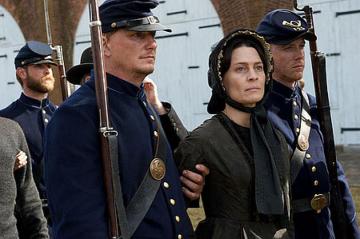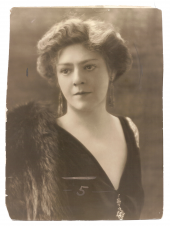'Conspirator' explores conspiracy surrounding Lincoln's assassination
April 14, 1865: Praise God, the Civil War -- worst and longest of all our national nightmares -- is over!
Not quite. Abraham Lincoln would have just 48 hours to savor Lee's formal surrender to Grant at Appomattox. A well-known actor would provide the bad American dream with a theatrical horror-show finale.
There is no less lamented category of characters than that of presidential assassins, which means director Robert Redford and actress Robin Wright have their work cut out for them in "The Conspirator." They've risen to the challenge with a film that pays meticulous attention to historical detail, from its opening grisly images, keyed to Matthew Brady photographs of the Gettysburg battlefield, to the demise of its anti-heroic title figure.
That would be Mary Surratt, age 42, owner of the boardinghouse where John Wilkes Booth and his cohorts refined their cabal. The tricky business of this movie would be to make her empathetic enough for audience purposes but not too sympathetic for history's sake.
The riveting assassination scene is followed by its ensuing chaos: men carrying Lincoln out of Ford's Theater and across the street, holding his bloody head and frantically knocking on doors for a refuge, while our hero, Capt. Fred Aiken (James McAvoy), watches in horror and grasps the magnitude of the deed.
Mary Surratt is introduced to us in dramatic fashion at her military trial soon after, when the hoods (worn by the alleged conspirators even in their cells) are removed one by one. Last to be unhooded is Mrs. Surratt, a Southern sympathizer (and devout Catholic), whose move from Maryland to operate a boarding house in Washington coincided with Booth's need for a base of operations there.
"She built the nest that hatched the egg," President Andrew Johnson would later say -- concealing, aiding and assisting the conspirators.
Mrs. Surratt would say they were just customers, whose activities she didn't know. "They" were 20-year-old Lewis Powell, the athletic giant who nearly killed Secretary of State William Seward; David Herold, a "feeble-minded" 19-year-old, who accompanied Booth on his post-assassination flight to Virginia; and George Atzerodt, who was assigned to kill then-Vice President Johnson and got cold feet.
But Mary's biggest legal problem was her son John Surratt, a Confederate courier who moved messages and cash back and forth across enemy lines, knew the area well, and was to be the conspirators' getaway guide out of town. He thought the plan was to kidnap and ransom Lincoln in exchange for Confederate prisoners -- not kill him. John left Washington two weeks before the murder and is now in hiding. Mary knows but won't tell where -- and is in desperate need of a defense attorney.
Capt. Aiken, now a lawyer, is asked to defend her but demurs, believing her guilty. Let this cup pass from his lips. But an avuncular senator (Tom Wilkinson) prevails upon him. The result is a spirited defense -- much too spirited for Secretary of War Edwin Stanton (Kevin Kline): "He'll make enemies he won't soon forget."
Jim Solomon's screenplay, based on the trial transcripts, and Kalina Ivanov's production design details are admirably authentic, down to the umbrella with which Mrs. Surratt was provided, shielding her from the sun's rays on the way from her cell to the gallows, walking past the coffin and open grave awaiting her. But -- although one can't imagine a more chillingly dramatic story than this one really is -- some "dramatic license" has been taken (see story below).
Even the infamous Dr. Samuel Mudd (as in "your name is ..."), who introduced John Surratt to Booth and treated Booth's broken leg after the assassination, got a life instead of a death sentence. To the last minute, everyone thought President Johnson would reprieve Mrs. Surratt, if nothing else for her gender (no woman had ever been executed in U.S. history). But he couldn't, or didn't, for fear of being called "soft" -- caving in, like his current counterpart, to pressure instead of relying on the constitutional guarantee of civil trial by a jury of peers.
It is Mr. Redford's not-so-secret agenda to draw that comparison in this otherwise classic "Inherit the Wind"-type courtroom drama, whose 123 minutes go by fast, thanks to crisp, no-frills editing. Mr. Redford is a businesslike, not an elegant, director. His choppy transition scenes often last less than 30 seconds, but he gets the job done -- with the help of a fine cast, headed by the tremendously appealing Mr. McAvoy, the subtly restrained Ms. Wright, and Mr. Kline's rendering of Stanton as a combination of Donald Rumsfeld and Alexander Haig: "600,000 dead -- someone must be held accountable!"
It should probably have been John and not Mary Surratt, but the prosecutor says, "I'll settle for either one." Was she really guilty, or did she take the noose for her son? We'll never know because there was never a fair civil trial.
It seems to be a recurring problem. The day of "The Conspirator" preview screening, the Post-Gazette's front-page headline was: "9/11 suspects to face military trials." For Khalid Sheikh Mohammad, like Mrs. Surratt, the difference between "assassin/terrorist" and "alleged assassin/terrorist" may be moot.






